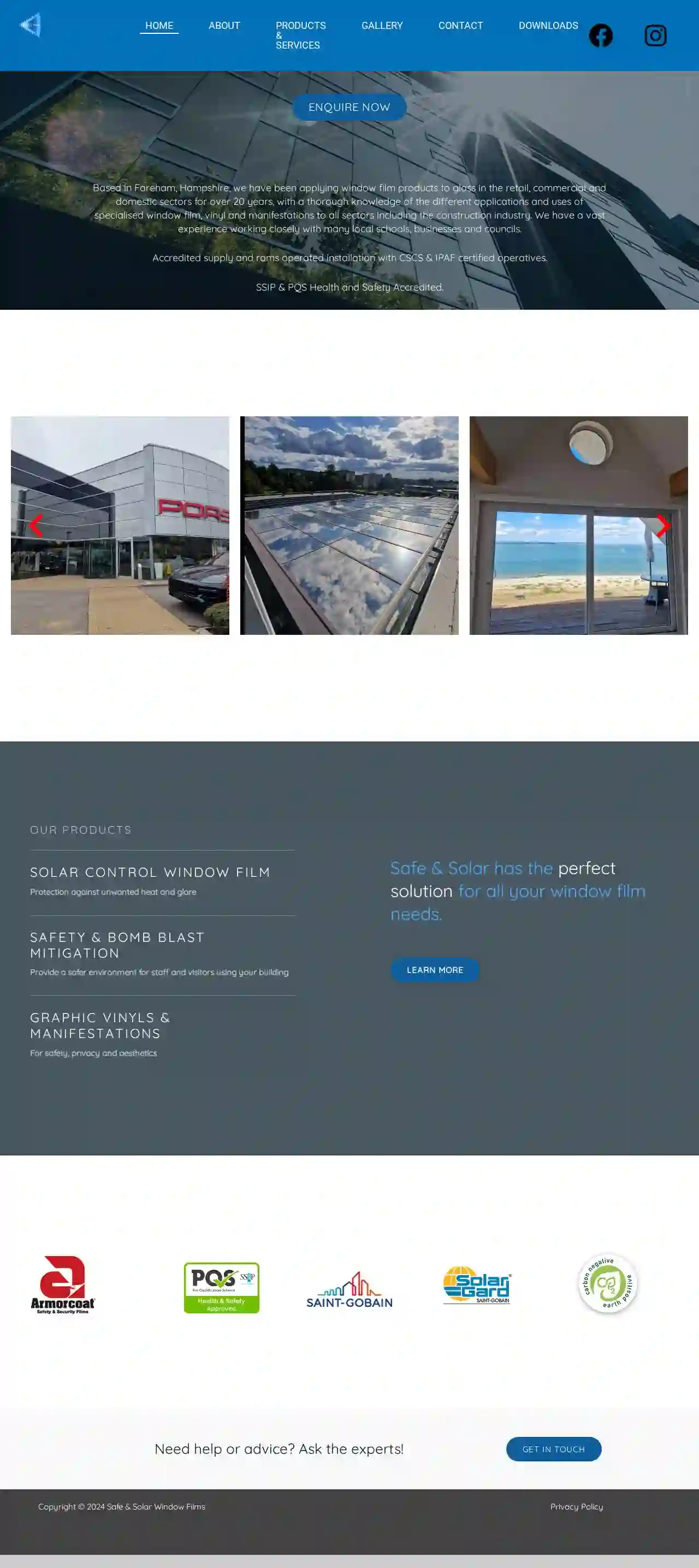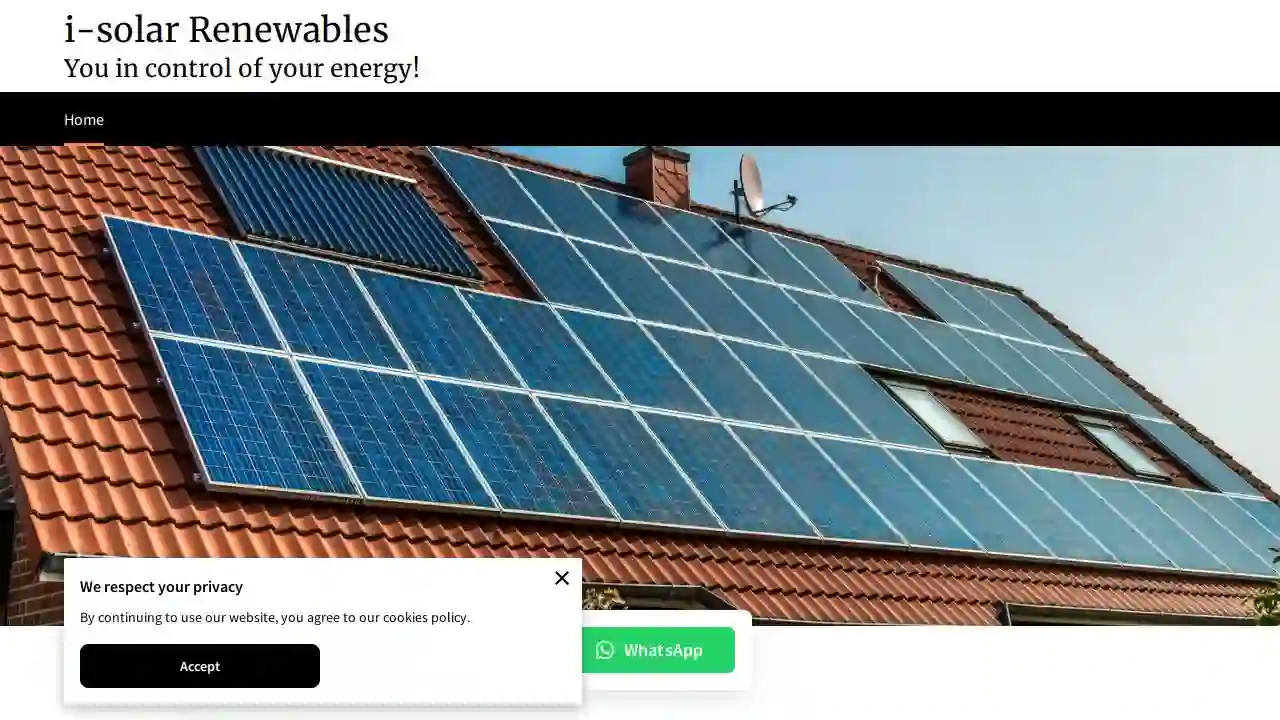Solar Installers Canford Cliffs
Top 10 Local Solar Installers in Canford Cliffs
Receive multiple Solar Company quotes for your project today! Compare profiles, reviews, accreditations, portfolio, etc... and choose the best service.

Recharge Renewable
4.972 reviews6 Knapps Drive, Winscombe, BS25 1BD, GBRecharge Renewable is your local and trusted partner delivering solar panels, solar PV, EV chargers, and battery storage. Specialists in EV charging, PV, and solar panel installation across Somerset. We offer a personal and bespoke design and service to meet your energy needs, ensuring a sustainable and efficient future. Recharge your batteries today!
- Services
- Why Us?
- Accreditations
- Our Team
- Gallery
Get Quote
Abel Environmental Services Ltd
4.729 reviewsThe Premier Centre, Abbey Park Industrial Estate, Unit A7, Romsey, SO51 9DG, GBAES Limited is Hampshire's leading provider of HVAC and renewable energy solutions. Established in 1988, this family-run business boasts over 25 years of experience in the air conditioning, refrigeration, and renewable energy markets. AES offers a comprehensive range of products and services for both commercial and domestic customers throughout Hampshire and the South of England. Their commitment to integrity, reliability, honesty, and professionalism has earned them a reputation for excellence. AES specializes in the installation of solar PV, battery storage, and heat pumps, ensuring customers benefit from sustainable and efficient energy solutions.
- Services
- Why Us?
- Accreditations
- Gallery
Get Quote
Safe & Solar Window Films
517 reviewsPortsmouth, GBBased in Fareham, Hampshire, Safe & Solar Window Films has been applying window film products to glass in the retail, commercial and domestic sectors for over 20 years. We have a thorough knowledge of the different applications and uses of specialised window film, vinyl and manifestations to all sectors including the construction industry. We have a vast experience working closely with many local schools, businesses and councils. Safe & Solar is accredited for supply and rams operated installation with CSCS & IPAF certified operatives. We are also SSIP & PQS Health and Safety Accredited.
- Services
- Why Us?
- Gallery
Get Quote
D&R Energy
32 reviewsUnit 1 & 3, Mendip Business Park, Hewish, Weston-Super-Mare, BS24 6RX, GBD&R Energy Ltd is a company specializing in solar panel installation and battery storage. Established in 2012, their directors have been in the renewable energy sector since 2010, bringing extensive knowledge and expertise. They prioritize customer relations, offering a no-pressure sales approach and in-house technical support. The team at D&R Energy takes the time to understand each customer's needs and design a solar panel system that maximizes their return on investment. They are committed to providing a superb service with integrity and honesty, guiding clients towards cost-effective solutions even if it means less profit for the company. D&R Energy has completed thousands of installations across Weston-super-Mare, Bristol, Bath, North Somerset, and Wiltshire with a 100% customer satisfaction rate.
- Services
- Why Us?
- Our Team
- Testimonials
- Gallery
Get Quote
Innova
Cheltenham, GBInnova Renewables is a company dedicated to creating utility-scale renewable energy projects using a variety of technologies. Their mission is to take large energy-intensive users off-grid and accelerate the decarbonisation process. Established in 2014, Innova boasts a team of over 100 interdisciplinary professionals with a broad capability and a highly commercial approach. They aim to deliver long-term innovative solutions to energy and environmental problems, with an expected capital deployment of £1 billion over five years. Innova's in-house operational capability spans asset management, financial, legal, monitoring, and technical support, working with best-in-class O&M and specialist contractors to deliver their operational strategy. Their expertise across the full project management lifecycle enables them to achieve enhanced performance metrics, longevity, minimize risk, and drive returns.
- Services
- Why Us?
- Gallery
Get Quote
Lumia ltd
53 reviewsHavant, GBLumia AV is a company specializing in electrical, solar, EV charging, and audio-visual solutions. With over 17 years of experience, they provide integrated services to businesses, education, and residential sectors. Lumia AV is known for its personalized approach, offering consultancy, strategic planning, installation, and ongoing support and maintenance. They are registered OLEV and NICEIC EV installers and approved installers of My Energi products.
- Services
- Why Us?
- Testimonials
- Gallery
Get Quote
Kendrick Renewables
51 reviewsBlock 11, 13-15 Cater Road, Bristol, BS13 7TW, GBAt Kendrick Renewables, we specialise in all Solar & Renewable energy solutions such as Solar Panel design & install, EV charging, Battery Storage and system maintenance. We design & install solar panels for residential and commercial properties, fit bespoke EV charging units and offer a battery storage service. With accredited professionals on-hand to help you every step of the way, our approach is efficient, communicative and tailored to your exact needs; should that be affordability, maximum usage or to simply futureproof your home, we're here for you. Reducing your carbon footprint has never been so easy. Get in touch today for a free, no obligation quotation.
- Services
- Why Us?
- Accreditations
- Gallery
Get Quote
i-solar Renewables
Swindon, GBAt i-Solar Renewables, we believe in conducting business with integrity. As a family-owned company, we treat all our clients like family, providing honest quotes, friendly customer service, and highly trained professionals who deliver the peace of mind you deserve when switching to green energy. We understand that choosing solar energy can be daunting, so we're here to guide you. Our team of experienced consultants has one goal: to ensure our customers have the best buying experience in the industry. We take pride in that. i-Solar Renewables partners only with the best installers who hold the necessary accreditations to carry out your installation. Don't miss out on the opportunity to make the switch. Register your interest by sending us a message, giving us a call, or using our LiveChat via WhatsApp. We'll be happy to help you make the right choice and ensure you're well looked after throughout the entire process. We provide a streamlined and efficient installation process for both individual customers and corporations. Our self-motivated and skilled specialists are dedicated to providing top-quality equipment in our renewable energy installations. This allows us to deliver exceptional work at a reasonable price, leaving our clients satisfied and confident in our work. We believe that everyone should have access to affordable and sustainable energy solutions. That's why we're committed to providing our customers with the most cost-effective solar solutions available. Our team of experts will work with you to design a solar panel system that meets your specific needs and budget. Customer satisfaction is at the heart of everything we do. Our team of professionals is highly trained to ensure that all our products and services are of the highest quality. We're dedicated to delivering an outstanding customer experience, from the initial consultation to the final installation and beyond. We provide regular updates on your project's progress and are always available to answer any questions or concerns you may have. At i-Solar Renewables, we understand that our success is built on the satisfaction of our customers. That's why we're committed to providing you with the highest level of customer service, ensuring you feel supported and informed throughout your journey. Contact us today to experience our exceptional customer service firsthand and start enjoying the benefits of solar power with confidence.
- Services
- Why Us?
Get Quote
All Round Energy Solutions Ltd
Newport, GBWelcome to All Round Energy Solutions Ltd, your trusted energy solutions provider in Merthyr Tydfil and beyond! With over 40 years of experience, we cater to our valued customers with high-quality energy solutions. Our team of experts is dedicated to delivering a high-quality service, working with multiple well-known governing bodies. We cover a broad range of services, including heating, gas, and electrical installations and upgrades. We specialize in installing government-approved solar panels to help you harness clean and renewable energy. Join us in taking a step towards a greener future.
- Services
- Why Us?
- Accreditations
- Testimonials
- Gallery
Get Quote
Mirlando
123 Main Street, Suite 400, Los Angeles, 90210, GBMirlando is a leading provider of high-quality, custom-designed, and manufactured products. We specialize in creating innovative solutions for a wide range of industries, including aerospace, automotive, medical, and consumer electronics. With a team of experienced engineers and designers, we are committed to delivering exceptional products that meet the unique needs of our clients. Our state-of-the-art manufacturing facilities allow us to produce high-precision components with exceptional accuracy and reliability. We pride ourselves on our commitment to quality, innovation, and customer satisfaction. At Mirlando, we understand that every project is unique. That's why we work closely with our clients to understand their specific requirements and develop customized solutions that exceed their expectations. Our team of experts has a deep understanding of the latest technologies and manufacturing processes, enabling us to deliver cutting-edge products that drive innovation and performance. We are dedicated to providing our clients with exceptional service and support throughout the entire product development lifecycle. From initial concept to final delivery, we are committed to ensuring that our clients are completely satisfied with our products and services.
- Services
- Why Us?
- Accreditations
Get Quote
Over 3,485+ Solar Companies registered
Our solar installers operate in Canford Cliffs & surrounding areas!
SolarCompaniesHub has curated and vetted the Best Solar Contractors near Canford Cliffs. Find a top & reliable contractor today.
Frequently Asked Questions About Solar Installers
- System size (measured in kilowatts, or kW)
- Type of solar panels (monocrystalline, polycrystalline, thin-film)
- Roof complexity (pitch, size, obstructions)
- Labor costs in your area
- Available incentives and rebates
- Analyze your energy bills
- Assess your roof's suitability
- Calculate your potential solar energy generation
- Recommend a system size that meets your needs and goals.
- Solar Panel Warranty: From the panel manufacturer, typically covering defects in materials and workmanship for 10-25 years. Some manufacturers offer performance guarantees, ensuring a certain level of energy output over time.
- Solar Installation Warranty: From the solar installer, covering the quality of the installation work for 1-10 years. This warranty protects you from leaks, faulty wiring, or other issues caused by improper installation.
How do solar panels work?
What is the average cost of solar panel installation in UK?
How do I choose the right solar panel system size for my needs?
What kind of warranty should I expect for my solar panel system?
How do solar panels work?
What is the average cost of solar panel installation in UK?
- System size (measured in kilowatts, or kW)
- Type of solar panels (monocrystalline, polycrystalline, thin-film)
- Roof complexity (pitch, size, obstructions)
- Labor costs in your area
- Available incentives and rebates
How do I choose the right solar panel system size for my needs?
- Analyze your energy bills
- Assess your roof's suitability
- Calculate your potential solar energy generation
- Recommend a system size that meets your needs and goals.
What kind of warranty should I expect for my solar panel system?
- Solar Panel Warranty: From the panel manufacturer, typically covering defects in materials and workmanship for 10-25 years. Some manufacturers offer performance guarantees, ensuring a certain level of energy output over time.
- Solar Installation Warranty: From the solar installer, covering the quality of the installation work for 1-10 years. This warranty protects you from leaks, faulty wiring, or other issues caused by improper installation.